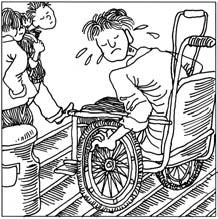 Beijing School for the Blind, founded in 1874 in downtown Beijing by Scottish missionary William Hill Murray, was relocated to a more desolate suburban spot in Haidian District in 1921. Beijing School for the Blind, founded in 1874 in downtown Beijing by Scottish missionary William Hill Murray, was relocated to a more desolate suburban spot in Haidian District in 1921.
More than 80 years have passed and the school is still at the same address in northwestern Beijing, currently educating some 170 students with visual impairment. Every day, the children have to pass through a tunnel underneath a busy railway line, going to and from the bus stop closest to the school. However, the tunnel is no more than 1.5 meters high and about the width of one-and-a-half cars. Without public works' maintenance, the road remains bumpy and rainwater gathers in puddles that take days to dry up. It is easy to imagine how difficult it is for the taller children and their parents to lower their heads to avoid bumping into the roof and battling through the tunnel every day, as some small motor vehicles have made it a convenient short cut. Three years ago, Beijing Television publicized the predicament of these visually impaired children. Meanwhile, some members of the top municipal advisory body the Beijing People's Political Consultative Conference also sent their proposals, urging the city to take steps to help the students and local residents. However, when the news crew returned to the place again late last month, they found nothing had changed. The city planners, the railway authority and other government agencies concerned "are still discussing ways to solve the problem". The fact that neither the media nor the political advisors had effected change for so many years is one of the many examples of administrative and social disregard for the disabled. There is no denying that the rapid economic and social progress China has experienced over nearly 30 years has dramatically changed the lives of many in China, the disabled included. Two years ago, the school's first batch of senior high graduates all got enrolled in the special education program at Beijing Union University. However, while the media praises the efforts of the government and society to help people with disabilities, it often overlooks how many social and administrative obstacles these students have encountered. In fact, the rules for college enrolment, despite modifications in recent years, still allow for colleges and universities to reject applicants with disabilities or chronic illnesses such as congenital heart diseases. Children with disabilities and congenital diseases grow up with more hurdles than their able-bodied peers can hardly imagine. They have few chances to ever enjoy the best schools or colleges in the country and have to settle for what is available and be thankful. And most people with disabilities are still struggling with the slim hope of getting treated as equals by society. The general argument is still that China remains a developing country and that the governments at all levels have done a lot. But a lot more has to be done. More importantly, while swift actions are called for to make life easier for the disabled, more affirmative regulations should be in place to facilitate actions from all walks of life so that children with disabilities are able to grow up and enjoy the same opportunities as their peers. E-mail: lixing@chinadaily.com.cn (China Daily 04/21/2007 page4)
|

